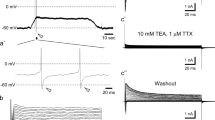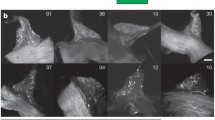Summary
The cathodal OFF response in electric taste, the production of a taste sensation at the break of a microampere cathodal current passed through the tongue, was studied electrophysiologically in the rat chorda tympani nerve. Previous work in electric taste has centered on ON responses to both anodal and cathodal currents. The cathodal OFF response, like ON responses, increased with increasing current intensity until a saturated response level was achieved. Unlike previously reported ON responses, the OFF response did not show a sensitivity to the ionic composition of the fluid bathing the tongue making this the first electrophysiological report of ion insensitivity in electric taste. The cathodal OFF response was sensitive to the duration of the current pulse preceding it. Longer pulses produced larger OFF responses, until with very long pulses (seconds) a saturated response level was achieved. The half maximal response occurred at 12.5 ms. These results have been interpreted to mean that the cathodal OFF response has an origin other than the microvillus membrane, the site most often implied for ON responses, due largely to its ion insensitivity. A probable location may reside with ion channels transversing the basal membrane which are transiently excited at the break of the current resulting in excitation at the receptor-afferent synapse.
Similar content being viewed by others
References
Beidler LM (1954) A theory of taste stimulation. J Gen Physiol 38: 133–139
Beidler LM (1975) Taste receptors. In: Galvin R et al. (eds) Sensory physiology and behavior. Plenum Publishing Corp, New York, pp 201–210
Bujas Z, Frank M, Pfaffmann C (1979) Neural effects of electrical taste stimuli. Sensory Processes 3: 353–365
Bujas Z, Szabo S (1972) The psychophysical functions relating the subjective intensity of electrically provoked taste to stimulus magnitude. Acta Instituti Psychologici Universitatis Zagrabiensis 65: 5–32
DeSimone J, Heck G, DeSimone S (1981) Active ion transport in dog tongue: a possible role in taste. Science 214: 1039–1041
DeSimone J, Heck G, Mierson S, DeSimone S (984) The active ion transport of canine lingual epithelia in vitro. Implications for gustatory transduction. J Gen Physiol 83: 633–656
Herness S (1985) Neurophysiological and biophysical evidence on the mechanism of electric taste. J Gen Physiol 86: 59–87
Kashiwayanagi M, Miyake M, Kurihara K (1983) Voltage-dependent Ca++ channel and Na+ channel in frog taste cells. Am J Physiol 244: C82-C88
Kashiwayanagi M, Yoshii K, Kobatake Y, Kurihara K (1981) Taste transduction mechanism. Similar effects of various modifications of gustatory receptors on neural responses to chemical and electrical stimulation in the frog. J Gen Physiol 78: 259–275
Ninomiya Y, Funakoshi M (1981) Role of ions in generation of taste nerve responses to electrical stimulation in rats. Jpn J Physiol 31: 891–902
Pfaffmann C, Pritchard T (1980) Ion specificity of “electric taste”. In: Van der Starre H (ed) Olfaction and taste VII, IRL Press, London, pp 175–178
Smith DV, Bealer SL (1975) Sensitivity of the rat gustatory system to the rate of stimulus onset. Physiol Behav 15: 303–314
Author information
Authors and Affiliations
Rights and permissions
About this article
Cite this article
Herness, M.S. The cathodal OFF response of electric taste in rats. Exp Brain Res 60, 318–322 (1985). https://doi.org/10.1007/BF00235926
Received:
Accepted:
Issue Date:
DOI: https://doi.org/10.1007/BF00235926




